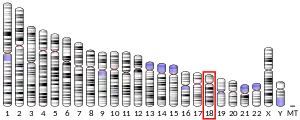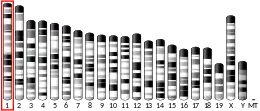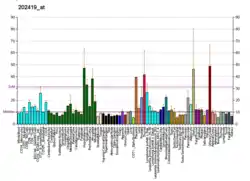3-dehydrosphinganine reductase
3-dehydrosphinganine reductase (EC 1.1.1.102) also known as 3-ketodihydrosphingosine reductase (KDSR) or follicular variant translocation protein 1 (FVT1) is an enzyme that in humans is encoded by the KDSR gene.[5][6][7][8][9]
| 3-dehydrosphinganine reductase | |||||||||
|---|---|---|---|---|---|---|---|---|---|
| Identifiers | |||||||||
| EC number | 1.1.1.102 | ||||||||
| CAS number | 37250-36-5 | ||||||||
| Databases | |||||||||
| IntEnz | IntEnz view | ||||||||
| BRENDA | BRENDA entry | ||||||||
| ExPASy | NiceZyme view | ||||||||
| KEGG | KEGG entry | ||||||||
| MetaCyc | metabolic pathway | ||||||||
| PRIAM | profile | ||||||||
| PDB structures | RCSB PDB PDBe PDBsum | ||||||||
| Gene Ontology | AmiGO / QuickGO | ||||||||
| |||||||||
Function
3-dehydrosphinganine reductase catalyzes the chemical reaction:
- sphinganine + NADP+ 3-dehydrosphinganine + NADPH + H+
Thus, the two substrates of this enzyme are sphinganine and NADP+, whereas its 3 products are 3-dehydrosphinganine, NADPH, and H+.
This enzyme belongs to the family of oxidoreductases, specifically those acting on the CH-OH group of donor with NAD+ or NADP+ as acceptor. This enzyme participates in sphingolipid metabolism.
Tissue distribution
Follicular lymphoma variant translocation 1 is a secreted protein which is weakly expressed in hematopoietic tissue.
Clinical significance
FVT1 shows a high rate of transcription in some T cell malignancies and in phytohemagglutinin-stimulated lymphocytes. The proximity of FVT1 to BCL2 suggests that it may participate in the tumoral process.[9]
References
- GRCh38: Ensembl release 89: ENSG00000119537 - Ensembl, May 2017
- GRCm38: Ensembl release 89: ENSMUSG00000009905 - Ensembl, May 2017
- "Human PubMed Reference:". National Center for Biotechnology Information, U.S. National Library of Medicine.
- "Mouse PubMed Reference:". National Center for Biotechnology Information, U.S. National Library of Medicine.
- Rimokh R, Gadoux M, Berthéas MF, Berger F, Garoscio M, Deléage G, Germain D, Magaud JP (January 1993). "FVT-1, a novel human transcription unit affected by variant translocation t(2;18)(p11;q21) of follicular lymphoma". Blood. 81 (1): 136–42. doi:10.1182/blood.V81.1.136.136. PMID 8417785.
- Kihara A, Igarashi Y (November 2004). "FVT-1 is a mammalian 3-ketodihydrosphingosine reductase with an active site that faces the cytosolic side of the endoplasmic reticulum membrane". The Journal of Biological Chemistry. 279 (47): 49243–50. doi:10.1074/jbc.M405915200. PMID 15328338.
- Krebs S, Medugorac I, Röther S, Strässer K, Förster M (April 2007). "A missense mutation in the 3-ketodihydrosphingosine reductase FVT1 as candidate causal mutation for bovine spinal muscular atrophy". Proceedings of the National Academy of Sciences of the United States of America. 104 (16): 6746–51. Bibcode:2007PNAS..104.6746K. doi:10.1073/pnas.0607721104. PMC 1868895. PMID 17420465.
- Persson B, Kallberg Y, Bray JE, Bruford E, Dellaporta SL, Favia AD, Duarte RG, Jörnvall H, Kavanagh KL, Kedishvili N, Kisiela M, Maser E, Mindnich R, Orchard S, Penning TM, Thornton JM, Adamski J, Oppermann U (March 2009). "The SDR (short-chain dehydrogenase/reductase and related enzymes) nomenclature initiative". Chemico-Biological Interactions. 178 (1–3): 94–8. doi:10.1016/j.cbi.2008.10.040. PMC 2896744. PMID 19027726.
- "Entrez Gene: FVT1 follicular lymphoma variant translocation 1".
External links
- Human KDSR genome location and KDSR gene details page in the UCSC Genome Browser.
Further reading
- Quintero-Ramos A, Valdez-Vélázquez LL, Hernández G, Baltazar LM, Padilla-Gutiérrez JR, Valle Y, Rodarte K, Ortiz R, Ortiz-Aranda M, Olivares N, Rivas F (2006). "[Assessment of five thrombophilic genetic polymorphisms among couples with habitual abortion]". Gaceta Médica de México. 142 (2): 95–8. PMID 16711541.
- Wang J, Blakey GL, Zhang L, Bane B, Torbenson M, Li S (September 2003). "Uterine tumor resembling ovarian sex cord tumor: report of a case with t(X;6)(p22.3;q23.1) and t(4;18)(q21.1;q21.3)". Diagnostic Molecular Pathology. 12 (3): 174–80. doi:10.1097/00019606-200309000-00009. PMID 12960700. S2CID 29863036.
- Nacheva E, Dyer MJ, Metivier C, Jadayel D, Stranks G, Morilla R, Heward JM, Holloway T, O'Connor S, Bevan PC (November 1994). "B-cell non-Hodgkin's lymphoma cell line (Karpas 1106) with complex translocation involving 18q21.3 but lacking BCL2 rearrangement and expression". Blood. 84 (10): 3422–8. doi:10.1182/blood.V84.10.3422.3422. PMID 7949096.
- Stoffel W, LeKim D, Sticht G (May 1968). "Biosynthesis of dihydrosphingosine in vitro". Hoppe-Seyler's Zeitschrift für Physiologische Chemie. 349 (5): 664–70. doi:10.1515/bchm2.1968.349.1.664. PMID 4386961.
- Stoffel W, LeKim D, Sticht G (December 1968). "Metabolism of sphingosine bases. 8. Distribution, isolation and properties of D-3-oxosphinganine reductase. Stereospecificity of the NADPH-dependent reaction of 3-oxodihydrospingosine (2-amino-1-hydroxyoctadecane-3-one)". Hoppe-Seyler's Zeitschrift für Physiologische Chemie. 349 (12): 1637–44. doi:10.1515/bchm2.1968.349.2.1637. PMID 4387676.




